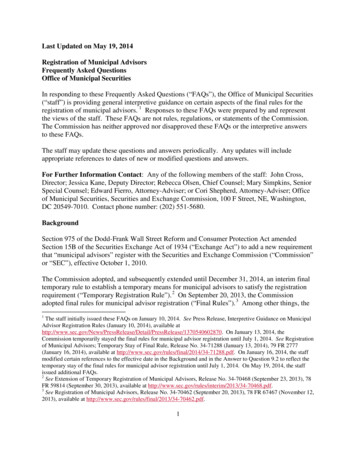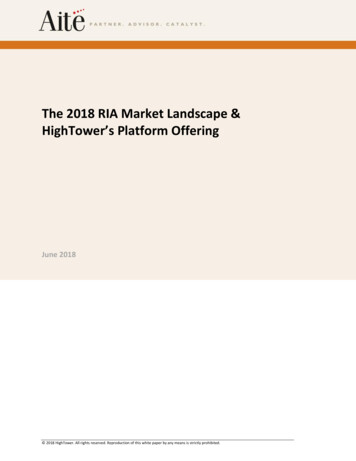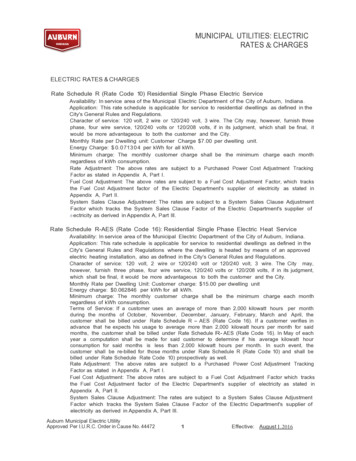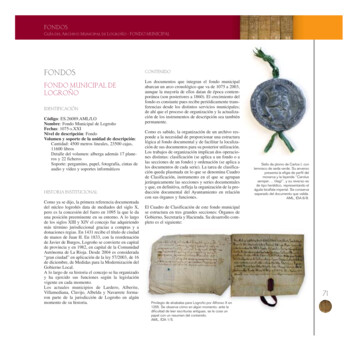
Transcription
Last Updated on May 19, 2014Registration of Municipal AdvisorsFrequently Asked QuestionsOffice of Municipal SecuritiesIn responding to these Frequently Asked Questions (“FAQs”), the Office of Municipal Securities(“staff”) is providing general interpretive guidance on certain aspects of the final rules for theregistration of municipal advisors. 1 Responses to these FAQs were prepared by and representthe views of the staff. These FAQs are not rules, regulations, or statements of the Commission.The Commission has neither approved nor disapproved these FAQs or the interpretive answersto these FAQs.The staff may update these questions and answers periodically. Any updates will includeappropriate references to dates of new or modified questions and answers.For Further Information Contact: Any of the following members of the staff: John Cross,Director; Jessica Kane, Deputy Director; Rebecca Olsen, Chief Counsel; Mary Simpkins, SeniorSpecial Counsel; Edward Fierro, Attorney-Adviser; or Cori Shepherd, Attorney-Adviser; Officeof Municipal Securities, Securities and Exchange Commission, 100 F Street, NE, Washington,DC 20549-7010. Contact phone number: (202) 551-5680.BackgroundSection 975 of the Dodd-Frank Wall Street Reform and Consumer Protection Act amendedSection 15B of the Securities Exchange Act of 1934 (“Exchange Act”) to add a new requirementthat “municipal advisors” register with the Securities and Exchange Commission (“Commission”or “SEC”), effective October 1, 2010.The Commission adopted, and subsequently extended until December 31, 2014, an interim finaltemporary rule to establish a temporary means for municipal advisors to satisfy the registrationrequirement (“Temporary Registration Rule”). 2 On September 20, 2013, the Commissionadopted final rules for municipal advisor registration (“Final Rules”). 3 Among other things, the1The staff initially issued these FAQs on January 10, 2014. See Press Release, Interpretive Guidance on MunicipalAdvisor Registration Rules (January 10, 2014), available sRelease/1370540602870. On January 13, 2014, theCommission temporarily stayed the final rules for municipal advisor registration until July 1, 2014. See Registrationof Municipal Advisors; Temporary Stay of Final Rule, Release No. 34-71288 (January 13, 2014), 79 FR 2777(January 16, 2014), available at http://www.sec.gov/rules/final/2014/34-71288.pdf. On January 16, 2014, the staffmodified certain references to the effective date in the Background and in the Answer to Question 9.2 to reflect thetemporary stay of the final rules for municipal advisor registration until July 1, 2014. On May 19, 2014, the staffissued additional FAQs.2See Extension of Temporary Registration of Municipal Advisors, Release No. 34-70468 (September 23, 2013), 78FR 59814 (September 30, 2013), available at .3See Registration of Municipal Advisors, Release No. 34-70462 (September 20, 2013), 78 FR 67467 (November 12,2013), available at http://www.sec.gov/rules/final/2013/34-70462.pdf.1
Final Rules interpret the statutory definition of the term “municipal advisor.” In addition, theFinal Rules interpret the statutory exclusions from that definition and provide certain additionalregulatory exemptions. In the Final Rules and the adopting release accompanying the FinalRules (“Adopting Release”), the Commission limited the scope of these exclusions andexemptions to certain identified activities as opposed to focusing on the status of the particularmarket participants.The Final Rules were effective on January 13, 2014; however, on January 13, 2014, theCommission temporarily stayed the Final Rules until July 1, 2014 and made conforming, nonsubstantive amendments to Rule 15Ba1-8 regarding recordkeeping requirements to conform thedates referenced in certain provisions of that rule to the July 1, 2014 date (“Temporary StayRelease”). 4 This stay of the Final Rules means that persons are not required to comply with theFinal Rules until July 1, 2014. In the Adopting Release, the Commission provided a phased-incompliance period, beginning on July 1, 2014 and ending on October 31, 2014, for municipaladvisors to comply with the requirement to register as municipal advisors using the finalregistration forms under the Final Rules. 5 The temporary stay of the Final Rules does not affectthis phased-in compliance period. 6Responses to Frequently Asked QuestionsSECTION 1: THE ADVICE STANDARDQuestion 1.1: The General Information Exclusion from Advice versus Recommendations:What are some relevant considerations regarding the content, context, and manner in which aperson may provide information (either in writing or in oral communications) to a municipalentity or obligated person without giving “advice” that would require registration as a municipaladvisor?Answer: Overview of Advice Standard. Under the Commission’s interpretation in the AdoptingRelease of the term “advice” solely for purposes of the municipal advisor definition, 7 the term“advice” is not susceptible to a bright-line definition and can be construed broadly, and thedetermination of whether a person provides advice to or on behalf of a municipal entity or anobligated person regarding municipal financial products or the issuance of municipal securitiesdepends on all of the relevant facts and circumstances. Further, in the Adopting Release, theCommission stated that “for purposes of the municipal advisor definition, advice includes,without limitation, a ‘recommendation’ that is particularized to the specific needs, objectives, orcircumstances of a municipal entity or obligated person with respect to municipal financialproducts or the issuance of municipal securities, including with respect to the structure, timing,terms, and other similar matters concerning such financial products or issues, based on all the4See Registration of Municipal Advisors; Temporary Stay of Final Rule, Release No. 34-71288 (January 13, 2014),79 FR 2777 (January 16, 2014), available at See Adopting Release, 78 FR at 67581-67583.6See Temporary Stay Release, 79 FR at 2777.7Adopting Release, 78 FR at 67479.2
facts and circumstances (emphasis added).” 8 Conversely, in the Final Rules, the Commissionadopted new Exchange Act Rule 15Ba1-1(d)(1)(ii) which expressly provides that “advice”excludes, among other things, the provision of general information that does not involve arecommendation regarding municipal financial products or the issuance of municipal securities(“general information exclusion”). In the Adopting Release, the Commission provided certainexamples of general information, including information of a factual nature without subjectiveassumptions, opinions, or views, and information that is not particularized to a specific municipalentity or type of municipal entity. 9The focus of the advice standard in the Final Rules is whether or not, under all the relevant factsand circumstances, the information presented to a municipal entity or obligated person issufficiently limited so that it does not involve a recommendation that constitutes advice. In otherwords, the determination of whether a person provides advice under the advice standard formunicipal advisor registration purposes generally involves whether the person makes arecommendation. In the Adopting Release, the Commission stated “for purposes of themunicipal advisor definition, the Commission believes that the determination of whether arecommendation has been made is an objective rather than a subjective inquiry. An importantfactor in this inquiry is whether, considering its content, context and manner of presentation, theinformation communicated to the municipal entity or obligated person reasonably would beviewed as a suggestion that the municipal entity or obligated person take action or refrain fromtaking action regarding municipal financial products or the issuance of municipal securities.” 10Examples of the General Information Exclusion from Advice. The staff believes that a personcould rely on the general information exclusion from advice under the Final Rules whenproviding a municipal entity or obligated person with information that does not involve arecommendation, such as factual information that does not contain subjective assumptions,opinions, or views. Examples of this type of general information include: (a) informationregarding a person’s professional qualifications and prior experience (e.g., lists, descriptions,terms, or other information regarding prior experience on completed transactions involvingmunicipal financial products or issuances of municipal securities); (b) general market andfinancial information (e.g., market statistics regarding issuance activity for municipal securitiesor current market interest rates or index rates for different types of bonds or categories ofcredits); (c) information regarding a financial institution’s currently-available investments (e.g.,the terms, maturities, and interest rates at which the financial institution offers these investments)or price quotes for investments available for purchase or sale in the market that meet criteriaspecified by a municipal entity or obligated person; (d) factual information describing varioustypes of debt financing structures (e.g., fixed rate debt, variable rate debt, general obligationdebt, debt secured by various types of revenues, or insured debt), including a comparison of thegeneral characteristics, risks, advantages, and disadvantages of these debt financing structures;and (e) factual and educational information regarding various government financing programs8Adopting Release, 78 FR at 67480.Adopting Release, 78 FR at 67479.10Adopting Release, 78 FR at 67480.93
and incentives (e.g., programs that promote energy conservation and the use of renewableenergy).In addition, the staff believes that information that is particularized to the municipal entity orobligated person in limited respects could be consistent with the general information exclusionfrom advice, provided that the information is factual in nature and does not contain or expresssubjective assumptions, opinions, or views, or constitute a recommendation. For example, thestaff believes that a person could provide general market information regarding a municipalentity’s particular outstanding bonds, such as current market prices and yields, without thisinformation constituting a recommendation.Potential Implied Recommendations. The staff further believes, however, that information that isparticularized in more than the limited respects described above in the immediately precedingparagraph to a municipal entity or obligated person potentially could imply a recommendationthat could constitute advice under the Final Rules, depending on all of the relevant facts andcircumstances. The more individually tailored the information is to a specific municipal entity orobligated person or group of municipal entities or obligated persons that share similarcharacteristics, the more likely the information will be considered to be a recommendation. Forexample, if a person provided information regarding debt financing structuring options that wastailored to address the specific needs, objectives, or circumstances of a municipal entity orobligated person, such as information tailored to address particular fiscal needs or to incorporateparticular revenue projections, the staff believes that presenting these particularized optionslikely would suggest a preferred financing approach that likely would imply a recommendation.Effect of Disclosures and Disclaimers on Advice Analysis. The staff believes that disclosuresand disclaimers regarding a person’s intentions in providing information to a municipal entity orobligated person are factors that bear upon whether or not the person’s communications wouldbe a recommendation that constitutes advice under the Final Rules. The staff believes that thefollowing disclosures and disclaimers, clearly and conspicuously stated, in written materials thataccompany communications to a municipal entity or obligated person, would be factors thatweigh against treatment of information as a recommendation that constitutes advice: (a) thisperson is not recommending an action to the municipal entity or obligated person; (b) this personis not acting as an advisor to the municipal entity or obligated person and does not owe afiduciary duty pursuant to Section 15B of the Exchange Act to the municipal entity or obligatedperson with respect to the information and material contained in this communication; (c) thisperson is acting for its own interests; and (d) the municipal entity or obligated person shoulddiscuss any information and material contained in this communication with any and all internalor external advisors and experts that the municipal entity or obligated person deems appropriatebefore acting on this information or material.Effect of Overall Course of Conduct on Advice Analysis. The staff further believes that, whilethe presentation of information with the disclosures and disclaimers described above are factorsthat suggest that a person may not be making a recommendation that would constitute adviceunder the Final Rules, such disclosures and disclaimers are not controlling and must beconsidered in the context of a person’s overall course of conduct, taking into account all of the4
relevant facts and circumstances. Thus, any actions or communications that are inconsistent withthese disclosures and disclaimers or inconsistent with the arm’s length nature of a non-advisorybusiness relationship between a person and a municipal entity or obligated person could suggestthat the person is making a recommendation and acting as a municipal advisor, which, absent anavailable exemption, would require registration with the Commission as a municipal advisor.[January 10, 2014]Question 1.2: Treatment of Business Promotional Materials Provided By PotentialUnderwriters Under the General Information Exclusion from Advice: What are somerelevant considerations regarding the content, context, and manner in which a broker-dealer mayprovide business promotional materials (either in writing or in oral communications) to amunicipal entity or obligated person for which the broker-dealer seeks to serve as underwriter ona future issuance of municipal securities under the general information exclusion from advice?Answer: Introduction and Overview. The Final Rules permit a broker-dealer to communicatewith a municipal entity or obligated person as part of an effort to obtain business and suchcommunication could include business promotional materials that present factual informationthat does not involve a recommendation. In relevant part, the Adopting Release includes thefollowing statement:The Commission notes that not all communications with a municipal entity or obligatedperson constitute municipal advisory activities. If the person has identified himself orherself as seeking to obtain business, such as serving as an underwriter on futuretransactions, whether such communications and analyses constitute municipal advisoryactivities or the provision of general information (as discussed further above) will dependon the specific facts and circumstances. For example, pursuant to the Commission’sinterpretation of the treatment of the provision of general information, the Commissionbelieves that a broker-dealer who provides information to a municipal entity regarding itsunderwriting capabilities and experience or general market or financial information thatmight indicate favorable conditions to issue or refinance debt likely would not be treatedas engaging in municipal advisory activity. 11Absent an available exclusion or exemption, such as the exclusion for a registered broker-dealerserving as underwriter on a particular issuance of municipal securities after engagement in suchcapacity, a broker-dealer cannot provide advice on an issuance of municipal securities withoutregistering with the Commission as a municipal advisor.Examples of the General Information Exclusion from Advice in the Context of BusinessPromotional Materials from Potential Underwriters. The staff believes that a potentialunderwriter could rely on the general information exclusion from advice under the Final Ruleswhen providing a municipal entity or obligated person with information that does not involve arecommendation, such as business promotional materials that are factual in nature and do notcontain subjective assumptions, opinions, or views. In addition to those examples set forth in11Adopting Release, 78 FR at 67514.5
“Examples of the General Information Exclusion from Advice” in the Answer to Question 1.1,examples of this type of general information include: (a) information regarding a broker-dealer’sunderwriting capabilities and experience (e.g., lists, descriptions, terms, or offering materials ofmunicipal securities transactions previously underwritten by the broker-dealer); (b) generalmarket or financial information that might indicate favorable conditions to issue debt orrefinance outstanding debt; (c) certain educational materials 12 (e.g., information describing therequirements of state laws that authorize municipal entities to issue certain types of bonds tofinance capital projects); and (d) factual information regarding the different types of debtfinancing structures available to such municipal entity to finance capital projects underapplicable state law.In addition, the staff believes that business promotional materials could include the followingtypes of information without constituting a recommendation: (a) an indication of hypotheticalnew issue pricing range that takes into consideration current market conditions and certainfactual information particularized to an issuer, such as the issuer’s credit rating, geographiclocation, and market sector; (b) information regarding an issuer’s outstanding municipalsecurities, such as current market prices and yields; (c) information regarding a range ofhypothetical interest rates or debt service requirements for a new money debt with variousmaturities (e.g., a level debt service payment schedule for a fixed rate debt with a 20-year or 30year maturity) based on the facts described in clause (a) of this paragraph; (d) public informationregarding the terms and a range of interest rates for the special U.S. Treasury Securities of theState and Local Government Series (“SLGs”) that are available for direct purchase from the U.S.Treasury Department for use as refunding escrow investments; and (e) mathematical calculationsof a municipal issuer’s hypothetical potential interest cost savings if it were to issue refundingbonds to refinance its outstanding municipal securities at a range of estimated current marketrates, based on the assumption that the refunding bonds have the same debt structure (i.e.,principal and interest is payable at the same times, in the same or proportionate amounts, andwith the same final maturity date) as the issuer’s outstanding bonds to be refunded and furtherbased on the facts described in clause (a) of this paragraph.For example, if a municipal entity had outstanding fixed rate municipal securities with a debtstructure involving substantially level annual debt service payments and a 30-year final maturitydate, the staff believes that the business promotional materials could include mathematicalcalculations showing hypothetical potential interest cost savings if the municipal issuer were torefund those municipal securities at a range of estimated current market rates, based on theassumption that the refunding bonds had the same debt structure involving substantially levelannual debt service payments and the same final maturity date as the outstanding bonds withoutconstituting a recommendation.Potential Implied Recommendations in the Context of Business Promotional Materials fromPotential Underwriters. The staff further believes that the more individually tailored theinformation is to a specific municipal entity or obligated person or group of municipal entities orobligated persons that share similar characteristics, the more likely the information will be12See Adopting Release, 78 FR at 67480.6
considered to be a recommendation. For example, if a broker-dealer provided debt structuringoptions that were tailored to address the specific needs, objectives, or circumstances of amunicipal issuer, such as tailored sizing, maturity, or security structures to address particularneeds, circumstances, or objectives of the municipal issuer within the issuer’s overall debtstructure, the staff believes that presenting these particularized debt structuring options likelywould suggest a preferred financing approach that likely would imply a recommendation.Similarly, in the case of a potential refunding or refinancing, while the provision of informationregarding estimates of hypothetical potential interest cost savings for a refunding of outstandingdebt at a range of estimated current market interest rates within the issuer’s existing debt servicestructure and final maturity date generally represents a way to convey factual information aboutcurrent market conditions that could meet the general information exclusion from advice, thestaff believes that presentations of more particularized refunding options that involverestructuring the issuer’s outstanding debt likely would imply a recommendation. For example,if a municipal issuer had outstanding fixed rate municipal securities involving a debt structurewith level annual payment debt service payments and a 30-year final maturity date, the staffbelieves that if business promotional materials included mathematical calculations showinghypothetical potential interest cost savings if the municipal issuer were to issue refunding bondsto refinance those outstanding municipal securities using a different debt structure that hadfeatures tailored or particularized for the municipal issuer that went beyond the existing structureof the outstanding bonds to be refunded (such as a structure involving nonlevel annual debtservice payments, non-interest paying capital appreciation bonds, or any extension of the finalmaturity date beyond that of the outstanding bonds to be refunded), those business promotionalmaterials likely would imply a recommendation.In addition, if business promotional materials include particularized or subjective viewsregarding interest rates that a broker-dealer expects that it can achieve for an underwriting ofmunicipal securities for a municipal entity or obligated person (as contrasted with a range ofhypothetical interest rates that takes into consideration current market conditions and factualinformation particular to the issuer), that particularized information likely would imply arecommendation.Effect of Disclosures and Disclaimers on Advice Analysis in the Context of Business PromotionalMaterials from Potential Underwriters. In the context of broker-dealers seeking to serve asunderwriters, the staff believes that the disclosures and disclaimers referenced in the Answer toQuestion 1.1 of these FAQs, together with the following additional disclosures and disclaimers,would be factors that weigh against treatment of business promotional materials as arecommendation that constitutes advice: (a) a statement that the broker-dealer seeks to serve asan underwriter on a future transaction and not as a financial advisor or municipal advisorconsistent with the MSRB Rule G-23 interpretive guidance; 13 (b) a description of the arm’s13See Answer to Question 5.1 herein discussing how a broker-dealer’s unilateral action to identify itself in writingas an underwriter and not as a financial advisor under MSRB Rule G-23 for purposes of that conflicts rule isinsufficient to establish that the broker-dealer has been engaged to serve as underwriter on a particular issuance ofmunicipal securities and thereby does not meet the underwriter exclusion.7
length nature of the underwriter’s role consistent with the disclosure required by MSRB Rule G17 in this regard; and (c) a statement that the information provided is for discussion purposesonly in anticipation of being engaged to serve as underwriter.Effect of Overall Course of Conduct in the Context of Business Promotional Materials fromPotential Underwriters. The staff further believes that, while the presentation of businesspromotional materials with the disclosures and disclaimers described above are factors thatsuggest that a broker-dealer may not be making a recommendation that would constitute adviceunder the Final Rules, such disclosures and disclaimers are not controlling and must beconsidered in the context of the broker-dealer’s overall course of conduct, taking into account allof the relevant facts and circumstances. Notably, a broker-dealer’s identification of itself inwriting as an underwriter and not as a financial advisor under MSRB Rule G-23 is only a factorin this analysis and the broker-dealer’s overall course of conduct, including written or oralcommunications made before and after the MSRB Rule G-23 disclosures, will inform theanalysis as to whether the broker-dealer made a recommendation that constitutes advice underthe Final Rules. Thus, any actions or communications that are inconsistent with thesedisclosures and disclaimers or that are inconsistent with the arm’s length nature of therelationship between a broker-dealer seeking to obtain underwriting business and a municipalentity or obligated person could suggest that the broker-dealer is making a recommendation andacting as a municipal advisor, which, absent an available exception, would require registrationwith the Commission as a municipal advisor. [January 10, 2014]Question 1.3: Indirect Advice: A municipal entity has engaged a registered municipal advisorto advise it on municipal financial products or a planned issuance of municipal securities. If amarket participant provides advice to the municipal entity’s registered municipal advisorregarding municipal financial products or such issuance of municipal securities withoutsatisfying the independent registered municipal advisor exemption, would such marketparticipant be required to register as a municipal advisor?Answer: Yes, in the staff’s view, absent an available exclusion or exemption, a marketparticipant who provides advice directly to a municipal entity or obligated person or indirectly toa municipal entity or obligated person through a third-party professional engaged by suchmunicipal entity or obligated person with respect to municipal financial products or the issuanceof municipal securities would be required to register with the Commission as a municipaladvisor. In relevant part, the Exchange Act and the Final Rules define a “municipal advisor” and“municipal advisory activities,” respectively, to cover a person that “provides advice to or onbehalf of a municipal entity or obligated person with respect to municipal financial products orthe issuance of municipal securities . . . .” 14 These definitions cover both direct advice to amunicipal entity or obligated person and indirect advice “on behalf of” a municipal entity orobligated person that is given through communications with third parties. Thus, for example, if aperson provides advice regarding municipal financial products or the issuance of municipalsecurities to a third-party that is a registered municipal advisor to a municipal entity or obligatedperson without satisfying the independent registered municipal advisor exemption (which would14See 15 U.S.C. 78o-4(e)(4) and Exchange Act Rule 15Ba1-1(e) (emphasis added).8
permit provision of such advice without requiring municipal advisor registration) or anotheravailable exclusion or exemption, the staff believes that the person would be providing indirectadvice “on behalf of” such municipal entity or obligated person through that third-party andwould be required to register as a municipal advisor. [May 19, 2014]Question 1.4: Terms for the Purchase of Securities in a Principal Capacity: An institutionalbuyer, such as a mutual fund, seeks to purchase municipal securities for its own account from amunicipal entity. If this institutional buyer provides the municipal entity with the structure,timing, and terms under which the institutional buyer would purchase securities for its ownaccount, would the institutional buyer be engaged in municipal advisory activity under the FinalRules?Answer: If an institutional buyer only provides information regarding the terms under which theinstitutional buyer would purchase securities for its own account and does not provide advice tothe municipal entity with respect to the structure, timing, terms, or other similar mattersregarding an issuance of municipal securities to be offered to other investors, the staff believesthat this institutional buyer would not be engaged in municipal advisory activity under the FinalRules. The Answer to Question 1.1 of these FAQs regarding the advice standard generallyapplies and is relevant to this analysis. In the staff’s view, the information regarding the termsfor this institutional purchase is in the nature of factual information that would meet the generalinformation exclusion to advice under Exchange Act Rule 15Ba1-1(d)(1)(ii). Further, in thescenario described above, the institutional buyer is acting as a principal to purchase securities forits own account, which is consistent with the arm’s length nature of a non-advisory businessrelationship. Absent other facts and circumstances evidencing advice, the staff believes thistransaction would not constitute advice to a municipal entity with respect to an issuance ofmunicipal securities. The staff notes that this advice analysis is applicable to a bank’s purchaseof municipal securities for its own account and that
1 Last Updated on May 19, 2014 . Registration of Municipal Advisors Frequently Asked Questions . Office of Municipal Securities . In responding to these Frequently Asked Questions ("FAQs"), the Office of Municipal Securities










